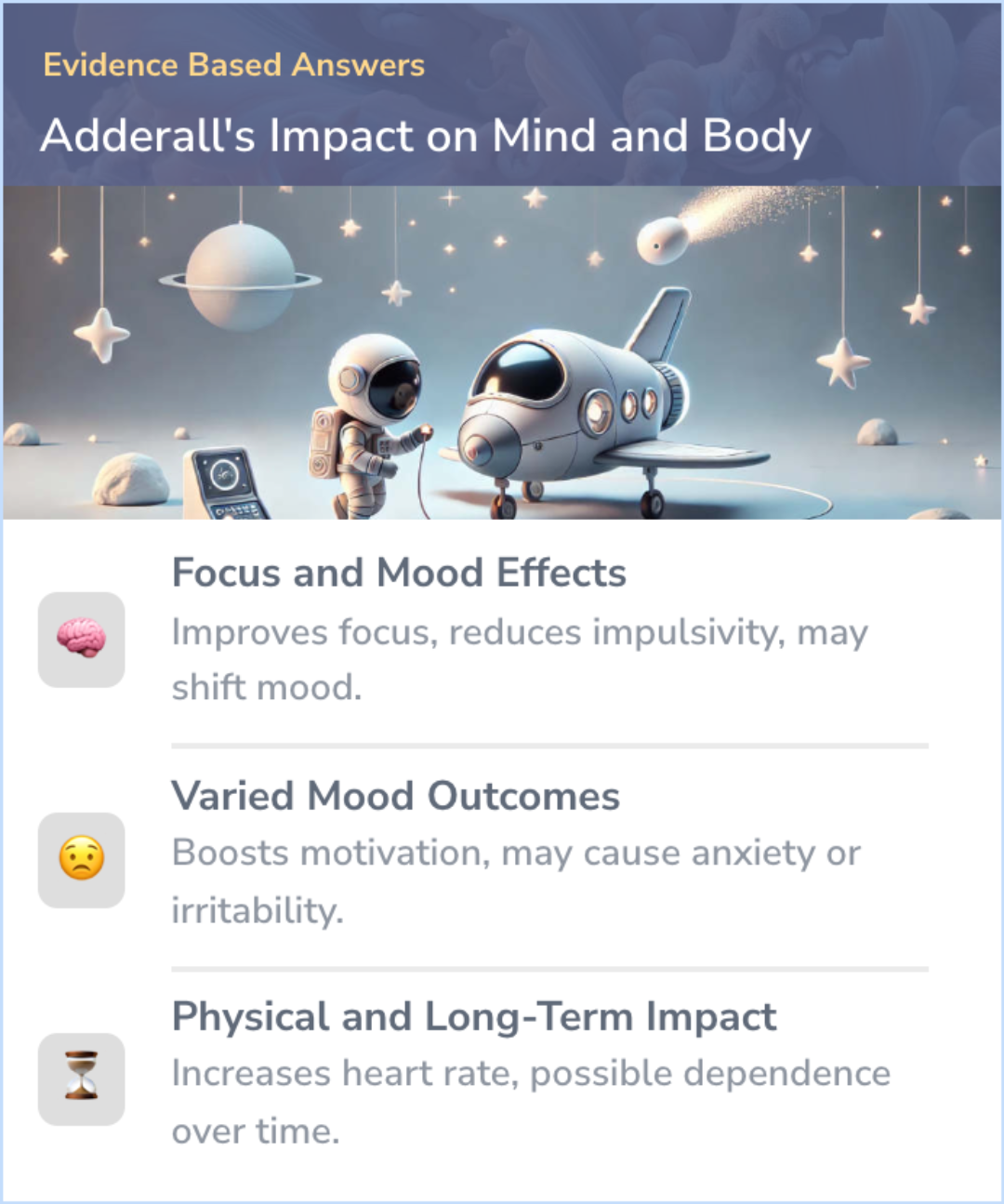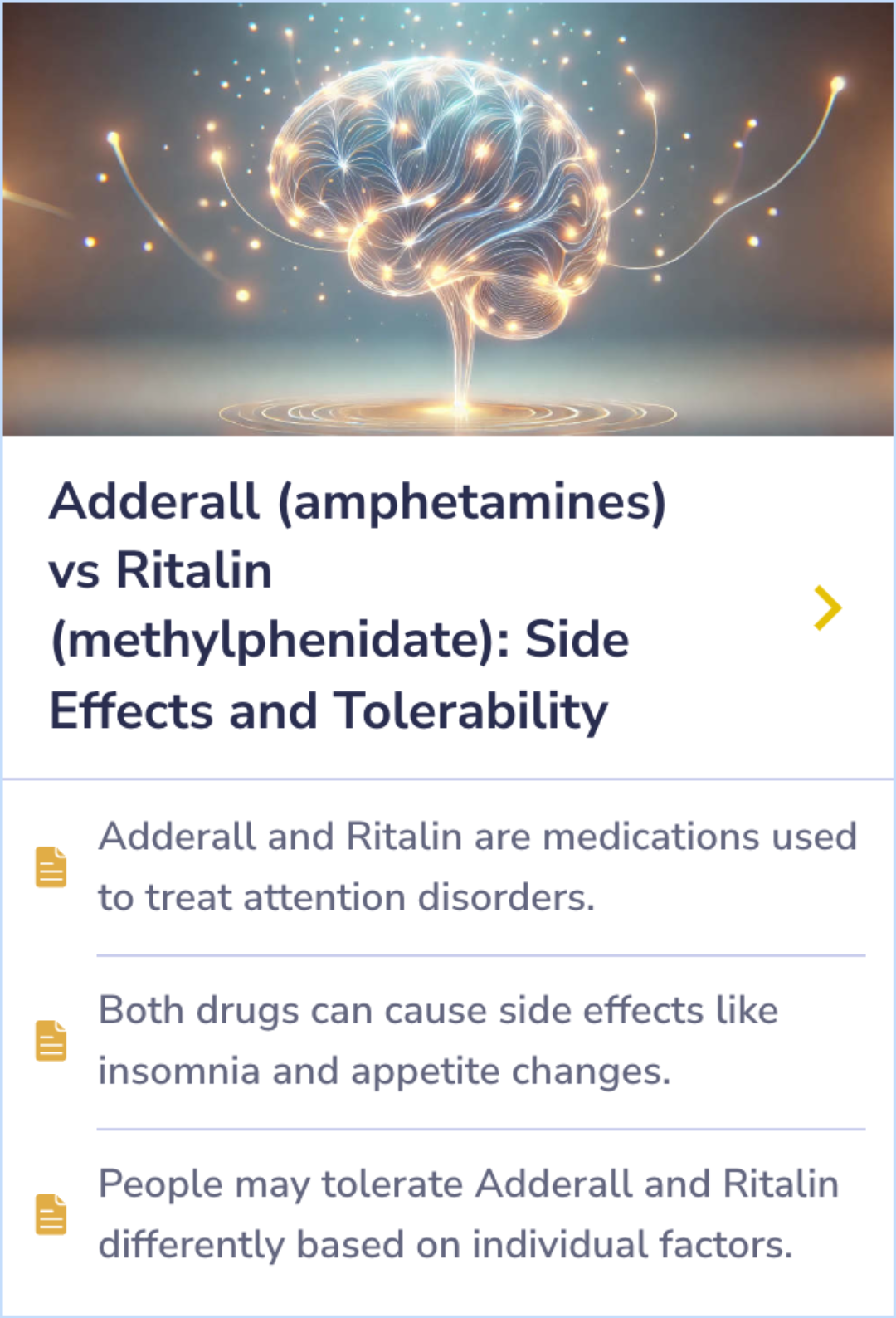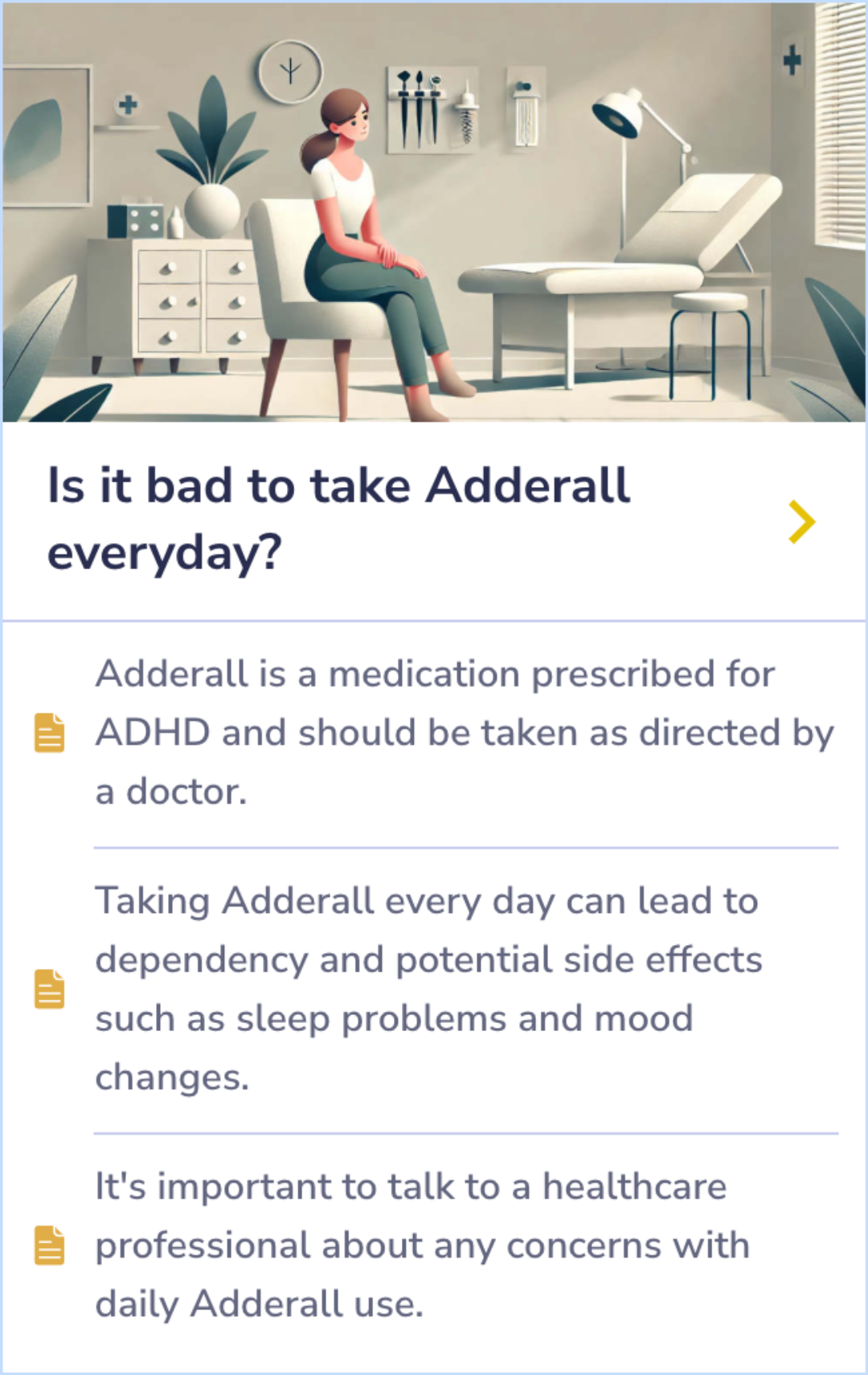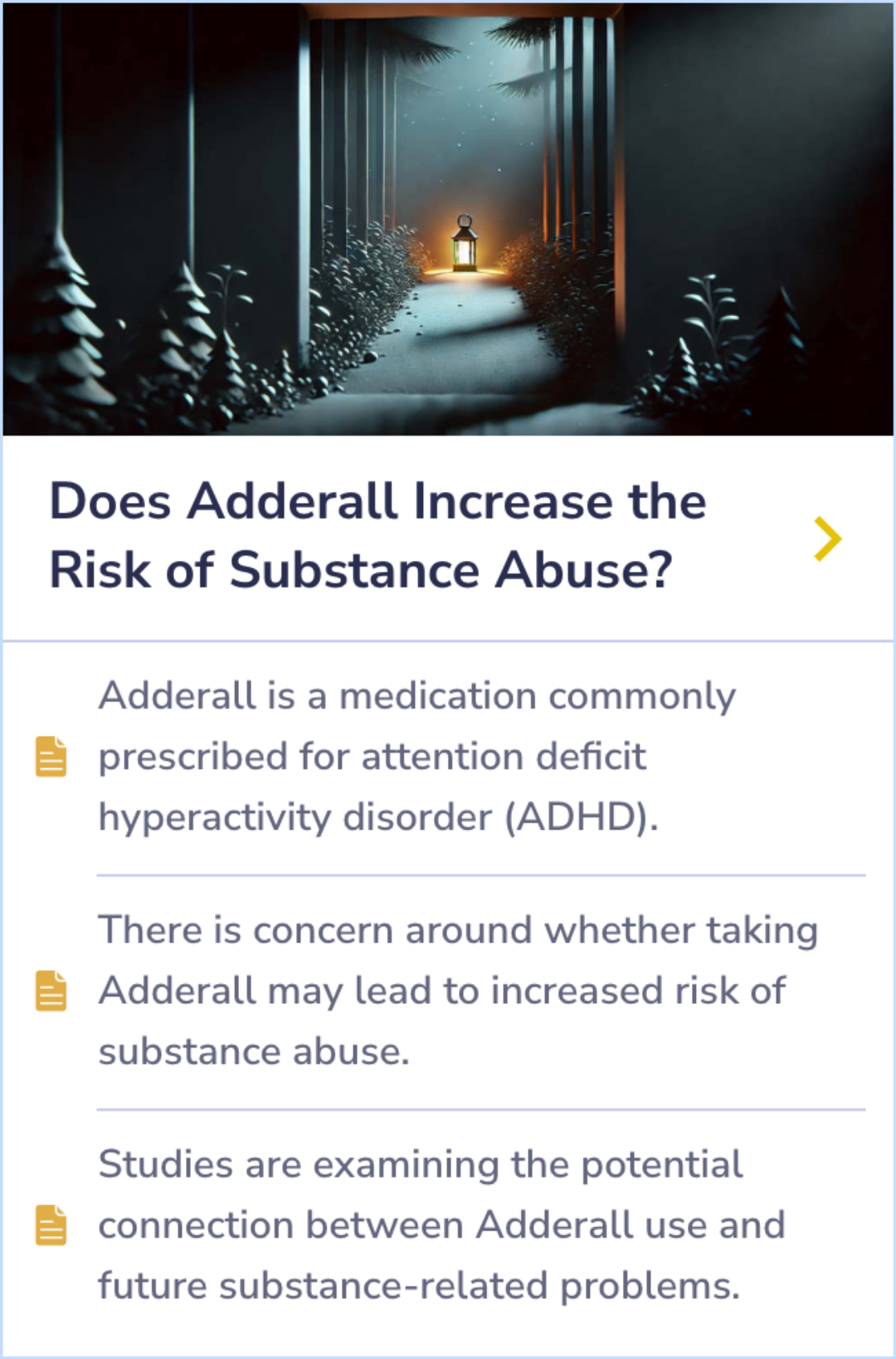Adderall
Evidence Based Answers
How does Adderall make you feel?
Adderall helps focus by improving attention and reducing impulsivity in ADHD, but mood swings like euphoria or anxiety may occur. It also causes physical side effects and potential dependence with long-term use.
Published: November 20, 2024
Click to explore a section:

Adderall boosts focus, affects mood, and may cause physical changes.
Personal Experiences
Perspectives: Perspectives on Adderall's Effects
In discussions about Adderall's effects, individuals describe a range of experiences. Some feel a sense of calm and focus, while others report increased productivity or enhanced social engagement. For some, it’s about getting through tasks with more ease, while others find the medication boosts emotional stability. However, for a few, it doesn't improve symptoms, or it intensifies them.
Reddit: u/killmeandeatme
For me I feel a sense of calm. Like the 4 radios playing at the same time turn off, and one radio is left playing beautiful music I can actually hear.Effects on Focus and Mood
Adderall can improve attention and focus in individuals with ADHD, helping with concentration and reducing impulsivity. This effect may make daily tasks easier to manage.
However, beyond focus, it can also cause mood changes, such as euphoria or, in some cases, anxiety and irritability.
However, beyond focus, it can also cause mood changes, such as euphoria or, in some cases, anxiety and irritability.
“
Source Quotes:
An advantage of stimulant medication is that they have a clinical effect almost immediately after starting.,Nontherapeutic effects such as euphoria or elevated mood may lead to misuse.
Adderall® may help increase attention and decrease impulsiveness and hyperactivity in patients with ADHD.,Central Nervous System Psychotic episodes at recommended doses, overstimulation, restlessness, irritability, euphoria.
Mood and Behavioral Changes
Adderall can result in both positive mood changes, like increased motivation and euphoria, and negative effects, such as anxiety, irritability, or even severe psychiatric symptoms.
Any sudden or unusual changes in mood or behavior should be discussed with a healthcare provider.
Any sudden or unusual changes in mood or behavior should be discussed with a healthcare provider.
“
Source Quotes:
you may experience unusual changes in your behavior.,Nontherapeutic effects such as euphoria or elevated mood may lead to misuse.
the pleasurable experience from d-amphetamine can lead to excessive use of it as a prescribed drug by the patient and the (mis)use of the prescription by others (diversion).
Physical Side Effects and Long-Term Use
Adderall may lead to physical effects, including increased heart rate, sweating, insomnia, and appetite changes. These side effects can impact quality of life for some people and may need careful management.
For children, long-term use raises concerns about growth and weight gain, while adults might experience tolerance or dependence over time.
For children, long-term use raises concerns about growth and weight gain, while adults might experience tolerance or dependence over time.
“
Source Quotes:
fast, pounding, or irregular heartbeat; sweating; dilated pupils; abnormally excited mood; restlessness; irritability; difficulty falling sleeping or staying asleep; hostility; aggression; anxiety; loss of appetite.,Dextroamphetamine and amphetamine may slow children's growth or weight gain. Your child's doctor will watch his or her growth carefully.
the effects of prolonged stimulant treatment have not been fully explored, and understanding such effects is a research priority.
Key Takeaways
Conclusions
Adderall can significantly enhance focus and attention in those with ADHD, providing relief from impulsivity and aiding in the completion of daily tasks. However, its use is linked to both positive and negative mood shifts, ranging from increased motivation and euphoria to anxiety and irritability.
Physical side effects, such as increased heart rate and appetite changes, require attention due to their potential impact on quality of life. Long-term usage warrants careful management, especially concerning growth in children and tolerance in adults.
Physical side effects, such as increased heart rate and appetite changes, require attention due to their potential impact on quality of life. Long-term usage warrants careful management, especially concerning growth in children and tolerance in adults.

Evidence Summary
Adderall vs Ritalin: Side Effects and Individual Response
Adderall and Ritalin are used to manage attention disorders, but they differ in how individuals respond to treatment. Some may experience insomnia or changes in appetite, with their reactions varying due to personal factors. Differences in tolerability can shape how well these medications work for each person.
Side effects like insomnia and appetite changes are common. The impact depends on individual responses, highlighting how one drug might work better for some than others.
Side effects like insomnia and appetite changes are common. The impact depends on individual responses, highlighting how one drug might work better for some than others.
Evidence Summary
Daily Adderall Use: Potential Side Effects and Risks
Adderall, a common ADHD medication, can lead to dependency when used daily and may cause side effects like disrupted sleep and mood changes. Consistent use requires careful monitoring.
Discussing concerns about daily use with a healthcare provider is recommended to ensure safe treatment. The potential for dependency highlights why dosage and timing should be tailored individually.
The medication works best when taken as prescribed, with adjustments guided by a professional.
Discussing concerns about daily use with a healthcare provider is recommended to ensure safe treatment. The potential for dependency highlights why dosage and timing should be tailored individually.
The medication works best when taken as prescribed, with adjustments guided by a professional.
Evidence Summary
Exploring Adderall’s Potential Link to Future Substance Abuse
The article highlights the potential link between Adderall, a medication commonly prescribed for ADHD, and future substance abuse concerns. While Adderall can effectively manage ADHD symptoms, some studies question whether its use might increase the risk of substance-related problems down the line.
Research is examining whether individuals who use Adderall, especially over extended periods, may be more prone to challenges with substance use in the future.
Research is examining whether individuals who use Adderall, especially over extended periods, may be more prone to challenges with substance use in the future.


